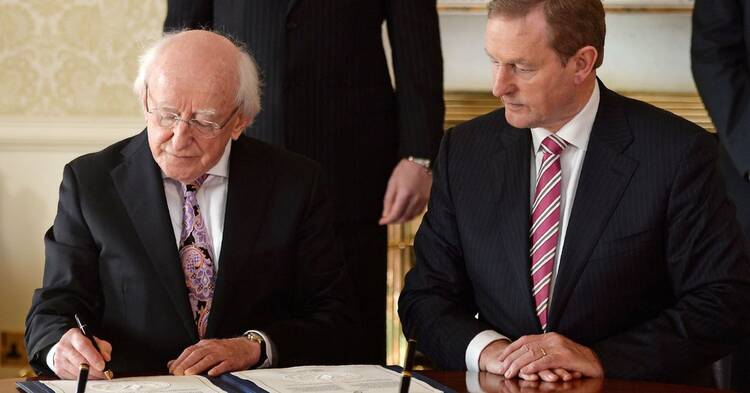For Ireland, 2016 will be a significant year, perhaps a momentous one. The next few weeks will be extremely busy ones for the Irish people. In the span of those few weeks, they will not only celebrate the feast of their patron, St. Patrick, with the customary week-long festival in March, but they will also give attention to a historical anniversary of note, the centenary of that event which led to the creation of the Irish state, the Easter Rising—an event which, depending on one’s political and/or religious colorization, will either be commemorated or celebrated. And as if these major events weren’t enough to deal with, the Irish people will also head to their polling places in less than two weeks’ time to vote for the establishment of a new national parliament that will result in the selection of new governmental leaders.
Ireland has been due for a new election; the last one was in 2011 and the usual term of a parliament is about 5 years. The Fine Gael/Labour coalition government of Prime Minister (or Taoiseach, as he is known in Gaelic) Enda Kenny will be judged for the way it has run the country’s affairs since it was elected and installed in the aftermath of Ireland’s economic and banking crisis that (like in the United States) nearly destabilized the national economic framework.
In the Irish case, though, the measures the Kenny government took became controversial because of its strict adherence to European Union dictates regarding stringent policy measures of cut-backs and retrenchment of historically provided social services that were demanded as part of an agreement in acceptance of a EU bail-out package, a package that was needed if Ireland was ever recover economically.
In certain quarters, the fact that the Kenny government took over these measures from Brian Cowen’s Fianna Fáil government (which precipitated the crisis through misguided decisions) was seen as something of an “economic Munich,” whereby Irish economic sovereignty was literally signed away. What was done to remedy the crisis was seen by many as not only unfair, but detrimental to the Irish themselves, for they had no role or say in what happened and as a result were burdened with the responsibility for correcting the errors of those who were responsible for them. In the intervening years, the various cut-backs and tax increases only served to increase the resentment and alienation of the Irish people toward their own government. The austerity measures were a blow to Irish pride and independence, but the Kenny government was determined to see it through; and in the estimation of many economic experts, Ireland, to a large extent, had managed the recovery better than her European counterparts.
On Wednesday Feb. 3, the general election began in earnest after Prime Minister Kenny made his way to the Irish White House (Áras an Uachtaráin) to witness President Michael D. Higgins sign a proclamation dissolving the 32nd Dáil (the lower house of the Irish Parliament), with new elections to be held on Friday, February 26th.
Ireland has 40 parliamentary constituencies with 158 members, down from the previously mandated 166, due to the Electoral Act that was passed in 2013. In the Republic of Ireland (southern Ireland) there are 4 major parties: the incumbent Fine Gael (led by Prime Minister Kenny of County Mayo), Fianna Fáil (led by Micheál Martin of County Cork), the Labour party (led by Joan Burton of County Dublin), and Sinn Féin (led by Gerry Adams, of County Louth, assayed for being a notorious IRA supporter and allegedly being an active participant during “The Troubles” of the 1970s-1980s). Four other parties are also participating: The Anti-Austerity Alliance—People Before Profit party, Reuna Ireland, the Social Democrats, and the Green party.
Whatever party wins a majority (79 seats) will form the next government. To most observers, that will likely not be the case: no one party will win enough to govern alone, thus another coalition. The question is what party will get to form the new government and what party will consent to join in a coalition to everyone’s satisfaction. Like their American counterparts, the party leader/candidates have had their share of debates. Three have been held and two remain. In the last one, the Sinn Féin leader was largely ignored and isolated while Mr. Kenny and Mr. Martin were the main antagonists. And like Americans, the Irish are making their discontent known to everyone who are courting their favors—and their votes.
All of this is being done against the backdrop of an even more contentious issue than that of a national election, important as that may be. In this year, through its St. Patrick’s celebrations and the commemorations of its national founding, Ireland will be undergoing a time of national reassessment of its very identity—a reexamination of what it means to actually be Irish. Irish society has, in the space of a few years, witnessed and undergone changes which has amounted to nothing more than a seismic shift, giving cause for such a reassessment, and not a little anxiety. Everyone knows what has happened to Ireland in its social, political, and religious practices; and in an ironic twist of fate, the land that was historically famous for its emigrants has to now deal with its own influx of immigrants who are not easily accepting or assimilating into the wider Irish society or culture.
The Irish are comparing the Ireland of 2016 with the Ireland of 1916 and they are given to the obvious speculation as to whether the Ireland of the present has lived up to the sacrifice of their founders a century ago. They wonder—and worry—whether their independence is illusory or real. And given the mismanagement and the disillusionment of the past years, they ponder whether they can really believe again in the pillars that was their society: their government and their church—and possibly, even themselves. When they enter their polling booths on Feb. 26, the Irish will begin to find out.








